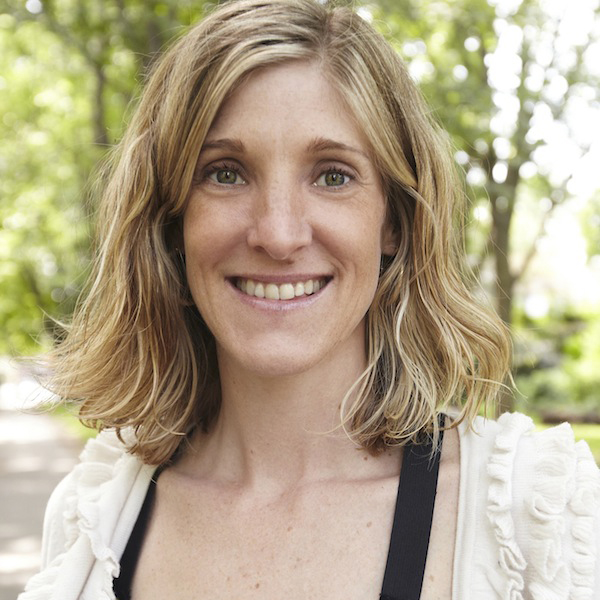In the Spotlight: Daphne Gordon

In the spotlight today: Daphne Gordon.
Daphne is one of my esteemed Story Intensive TAs, and it is my pleasure to introduce her as a writing teacher today.
Enrollment is open right now! You may request to be in her class – I do my best to place students with their choices.
Warmly,

Meet Daphne
Daphne Gordon is a journalist, fiction writer, and indie publisher. She loves to walk almost as much as she loves to write, so it makes sense that her downtown neighbourhood, Queen West, Toronto, is the source of most of her literary inspiration. Her first book, a fictional novella called Walking With Walser is in stores now. Daphne can be spotted in the neighbourhood's parks and libraries with her young son, or at outdoor movies or warehouse parties with her husband.
Handwriting or computer?
BOTH! The early part of the creative process, the imagining-of-the-characters and opening-up-of-my-mind parts, are definitely done with pen and paper, in my notebook. But as these raw materials start to build up in my notebook, I record their contents in my computer. As it builds up in the computer, and I start to march slowly towards completion of a particular project, writing becomes more and more about putting in time at the screen. Then I soon crave being with my notebook again. I think the notebook is my friend, a balancing influence. There has to be some time in the workflow for writing without knowing what I’m working on, for private writing, writing that will never be shared with anyone, unless I, the managing editor of my mind, choose to share it. I use my notebook in a very loose way, sometimes writing shopping lists and sometimes writing from the perspective of characters, sometimes observing the present moment. I am not actively working on a project, I do it partly so I can know what’s really going on in my mind apart from what’s happening on the screen, and so I can have that physical feeling of my hand moving across the page in that familiar way. My relationship with the screen is complex and ambivalent. Whereas, I love my notebook unconditionally and it loves me back. It’s a much simpler relationship.
Page count or time count?
Time count for sure. I spend between four and six hours a day on weekdays working, but sometimes the work isn’t about building up pages, it’s about rewriting, or editing or thinking or doing yoga or walking. I am incredibly lucky that I am able to structure my day this way. Most people do not have this luxury. And at other times in my life I haven’t had the time. I’ve been studying, or working in a demanding job, or I’ve been parenting. The fact is, those other things I was doing were all legit things to spend time on. So I take a long-term view, and I try not to get down on myself about my productivity, no matter what it is or isn’t at any given point in time. I just cross my fingers and hope I live a long time. I accept that I am never going to become a massively prolific writer, and I luxuriate in the slow, but I keep moving forward.
First drafts or revision?
BOTH! I crave both. For me revision is a very comfortable place to be. Because of my journalism experience, I’ve had training and experience as a copy editor. So I have a technical understanding of language, which leads to a feeling of competence and joy in revision. But it happens at a screen, in my little second-floor office. It’s boring and time consuming. It’s intensely tied to that one spot in the world, and involves sitting in a chair for long periods of time. First draft, on the other hand, is an uncomfortable, sometimes confused, wandering, timeless state of mind, but it’s also more open to input and it’s out in the world. In my years as a newspaper reporter, I developed the habit of going out in the field to observe something before I write. As a fiction writer, though, I’m mainly concerned about feelings, more so than I am about fact, so I go places I think might help me feel the feelings I want to write about. I take my notebook. I wear comfortable shoes. I make the experience of first drafting as pleasurable as possible, sometimes with help from coffee and croissants. On the other hand, when the weather is miserable, I take my notebook to the yoga mat, which makes writing pleasurable in a different way. I use visualization and breath and writing prompts to get started, and soon the writing takes over. This is where I finally feel safe enough to peek into the big, climactic scenes I’ve been putting off writing.
Writing solo, writing partner, or writing group?
ALL! This is becoming a theme isn’t it? I think my inability to really answer these questions is partly the answer to all of them. To become a writer who completes projects, you have to master the whole workflow, and the types of skills and behaviours required from a writer vary widely as the writer moves along the workflow. You have to be both a first draft and a revision person, and if you’re not, you would be wise to start working on that part of your workflow where you feel incompetent. You will probably not finally write something surprisingly amazing until you master both ends of the workflow. At the early end of the workflow, writing is a solo project. Then it becomes something you share with one person, one trusted, friendly person. Then it becomes something you share with a select group of people before you publish it. Then, when it is published, it is a conversation with the whole world. The writer must become comfortable with all aspects of workflow, so she must learn to be comfortable alone, with a partner, and in relationship with a group of others.
Earplugs/quiet or headphones/music?
Neither. I sit in my second-floor office with the door open. I work during the day and often play CBC Radio. It’s mostly news and talk, which can sometimes be distracting, but I turn the volume up or down depending on the work and my level of interest. I find that the news and the subject matter sometimes ends up in my writing, and I invite it in. I also sometimes listen to podcasts and other audio this way – in the background as I’m writing. I end up tuning the audio out most of the time. I think this habit of work was created during my years of working in a newsroom. A bit of noise helps me recreate the newsroom atmosphere, which was usually a productive, focused place for me.
Tell us about the excerpt you're sharing today.
Walking With Walser, is a rewrite of a 100-year-old book called The Walk. It's an iconic example of flânerie by the Swiss-German writer Robert Walser.
Excerpt from "Walking With Walser," by Daphne Gordon
ONE MORNING, as a desire to take a walk came over me, I put my hat on my head, left my writing room, or room of Facebook, and ran down the stairs to hurry out into the street.
On the sidewalk, I encountered a woman who looked Persian, Iranian, or Middle Eastern. She was towing an overburdened grocery tote and presented to the eye a certain pallid, faded majesty.
I was momentarily disturbed by everything she suggested, but my mood soon lifted. I strolled past a fragrant honeysuckle vine, then crossed the quiet street to caress a row of yellow roses, after which, in cordial acceptance of time’s breakneck pace, I continued along down toward the hum of Queen Street.
I do love to say its name. The status and might of royalty is implied off the top, and then a layer of femininity comes in, all of which is influenced by the sound of that initial word itself, how it breaks open the air in front of your face. You can’t help but smile when you say it. I challenge the reader to try!
It is perhaps arrogant to be convinced that one’s own neighbourhood is the best, most interesting, and delightful in the country. Yet my street’s cultural, historical, recreational, and economic merits are well-documented, and I make no secret of the fact that I sing the Queen’s sweet praises at least in part because she is my Queen.
She is the earth upon which I walk. She provides the food that fuels my every activity. On even the darkest night, she lights my way home. Therefore, I bow down to her. Not to do so would be a matter of being dead inside.
The morning world spread out before my eyes as beautiful to me as if I were seeing it for the first time. Everything I witnessed made upon me a delightful impression of friendliness, trendiness, and youth. I quickly forgot that up in my room, I had only just a minute before been brooding sleepily online. Ambition, self-righteousness, and disgust had now vanished, although I vividly sensed my avatar acting in the network as I walked along the street, tense with eager expectation of whatever friend or ex-friend I might encounter here in open public space.
Travelling east, I presented, as far as I know, an attractive yet modest countenance. My minimal breasts I like to conceal from the eyes of my admirers, both male and female. Showing them, in my opinion, gives away one of my scarcest resources—sexual power—for gratis mass consumption.
Conceding the delimiting effect of my androgynous image, I nonetheless guarantee the delivery of words potent enough to act simultaneously as balm to the soul and cocktail to the brain. In return for the virtuosic literary performance I have promised, I ask only for whatever small bit of undivided attention you might have at your disposal.
Discussion:
-
What remains with you after reading Daphne's work?
-
Can you articulate what’s working in this excerpt — and more importantly, why it’s working?
Please leave a comment below. And thank you, Daphne!
Photo credit: Wonderlane on Unsplash.

8 comments
Leave a comment